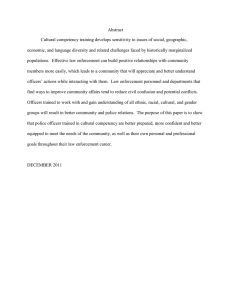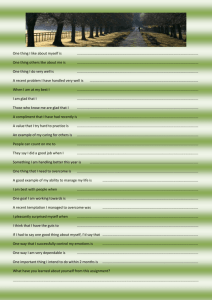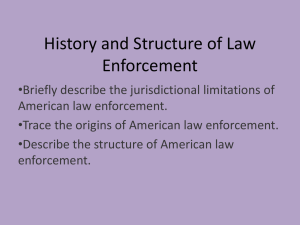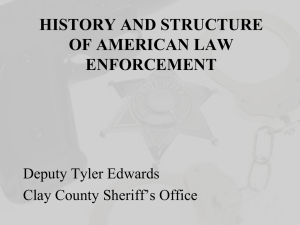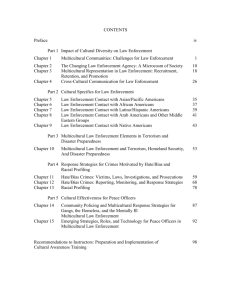Efolio reflection paper
advertisement
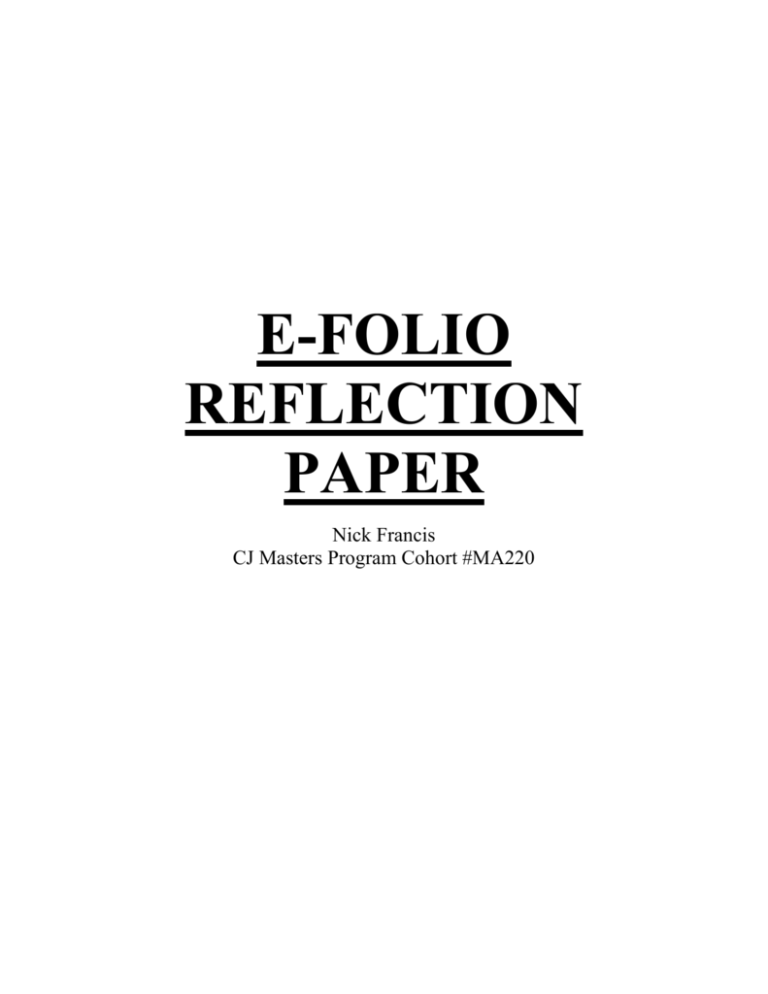
E-FOLIO REFLECTION PAPER Nick Francis CJ Masters Program Cohort #MA220 As I look back at my educational paradigm prior to entering this masters program, I find that I am pleasantly surprised with how it is actually working. Many of my thoughts and beliefs were molded by my high school and traditional college experiences. To further build on these learning experiences, I have found that many of my continuing education training for law enforcement has followed the traditional education format including lecture and written tests. The field of law enforcement is one that has many minimum standards which are taught and tested annually. That said, much of the training is geared for memory and minimum standards rather than critical thinking and problem solving courses. Classes such as first responder refresher, hazardous materials awareness, and OSHA standards classes are often dreaded by students resulting in poor learning habits and educational experiences that are not conducive to life-long learning. In high school and my undergraduate degree, the format was teacher-student where disciplines were lectured upon and very little classroom discussion took place. Not showing up or participating could be made up by reading the text books or borrowing someone else’s notes. My beliefs were that a teacher would remain the most knowledgeable on a topic and they would never be able to make a student as aware of the subject matter as they were. This type of learning environment created a “do the minimum” motto for me so I would merely complete the classes and obtain my diploma/degree. As a professional law enforcement trainer/instructor myself, I feel it is most important to learn how others view their opportunity to learn and their education. I currently instruct in several areas of law enforcement including firearms, speed radar, laser/lidar, DWI enforcement, and Taser (stun gun) use. Many of these classes are 1 licensure mandates and are set up to run exactly as I have described above in the traditional format. My intent in this masters program is to better understand adult professional learning and apply this to my everyday work ethic. In addition, I intend to incorporate my knowledge of adult learning to my own teaching approach to make the mandated training I instruct more beneficial to the officers attending and to the field as a whole. When I started this master’s cohort, it was immediately apparent that my fellow classmates had as much to offer in regards to learning as the teachers or assigned readings do The communication that takes place on-line is far and above better than any type of communication I have experienced in the traditional class format. Each member of my cohort brings professional experiences and knowledge to the group that none of us would be able to accomplish or experience ourselves. We can learn from others mistakes and mold ourselves to take other’s leadership styles and apply them to our lives to make us better. It is clear that all my new found experience with this advanced learning opportunity have no resemblance to my traditional beliefs of training or learning. I am pleasantly surprised about the potential of this group of professionals and I have no doubt that this form of online learning will continue to become more popular in the field of criminal justice. I have found it flexible, realistic, and a great example for student to student communication. This form of learning is especially important for me because I believe maintaining my healthy balance is as important as getting my paycheck. When I look back on the coursework thus far, I find very few instances when I have actively questioned the ideas presented in the coursework. Teachers have presented 2 material in an open format encouraging good discussions between students. Although we are all in the criminal justice field, jobs within this umbrella can differ greatly. That said, opinions and discussions involve different viewpoints but most are understandable and agreeable because they all come from within the criminal justice “system”. The one time that I did question material presented was during discussions with other students. A specific instance I recall was in the reflective adult learner course. During a self development discussion, the question of selfless acts came up. It was mentioned by several students that there are no such things as selfless acts. I challenged this notion not wanting to envision a world where absolutely everyone was out for themselves. It was argued that everything we do gives us some kind of gratification therefore we “get something” any time we help another person. In my introduction to law enforcement classes, instructors asked students why they wanted to get into the field. The predominant answer was “I want to help people.” In interviews for police officer candidates, prospective rookie’s state: “I want to make a difference in this community” or “I want to give back”. Police officers take pride in the fact that we are viewed as heroes. Many of us are required to put ourselves second when trying to save a life or rescue someone from a dangerous situation. When gunshots ring out, most people run away while we officers run toward them. To say that I am not selfless because I get gratification or even a paycheck for it is something I don’t agree with. Many of the police officers in the class stepped up and disagreed with the opinion that there are no more selfless acts. We gave plenty of examples to back our beliefs. If I was out there by myself with my own opinion, I wouldn’t have cared. My vision of this 3 field is solid and much of it is based on the fact that all police officers make a habit of helping others and take pride in our ability to act selflessly. Looking ahead, I am excited to employ many concepts from this masters program into my everyday habits to improve myself. I am a believer that my personal life and professional life are closely intertwined so I don’t plan on turning off the critical thinking or reflective learning switch when I take my uniform off. Specifically, I plan on working towards systems thinking to improve my personal life and police organization. Each day, I will look at situations and try to determine if I am looking at a symptom or a problem. Having a systems wide view will no doubt shed light on organizational behaviors and reduce stress in my life. I will better be able to analyze what all viewpoints are on a topic and how a decision made by one member of the system will affect another. I will also continue to employ reflective learning from this point forward. I see myself as a very reflective person. From a young age, I have been able to look inside myself to answer difficult questions posed by others. In the law enforcement profession, our duties force us to see people in good times and in bad. This gives us a great opportunity to learn about all aspects of humankind. By looking at these situations and evaluating how our actions can or did make a difference in someone’s life, we will better understand our place in this world and we will pick up skills that help us make a difference in our family, organization, and community. I’m excited about how my professional and personal character will mature after this learning experience. I’m confident that I am acquiring the skills of being a life-long learner. As I continue to learn, I will continue to spread the good word about all the life changing skills I am picking up from this program, and most importantly, my cohort. 4
